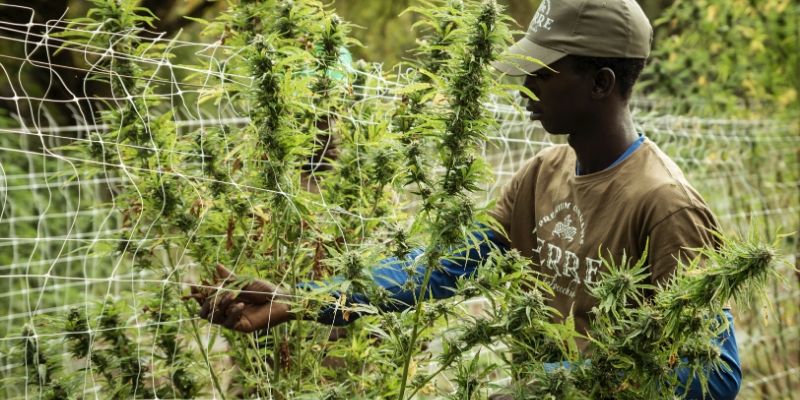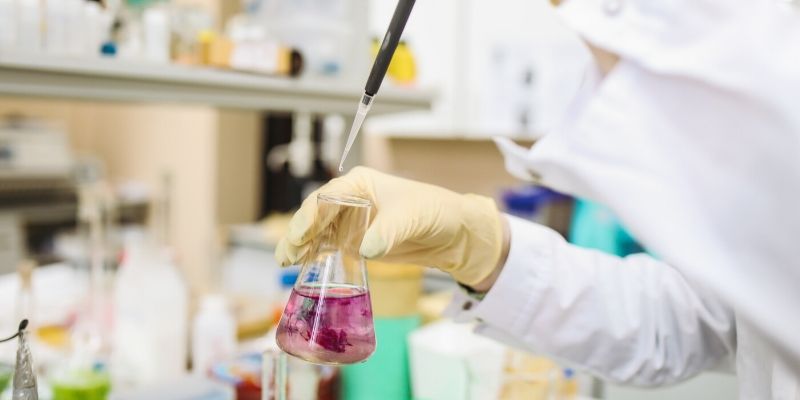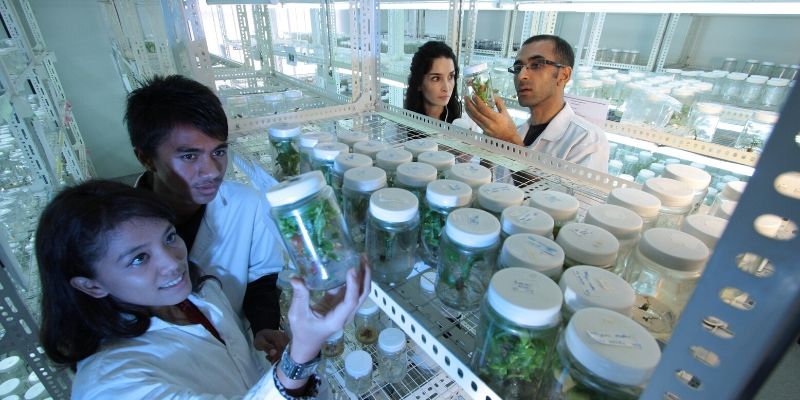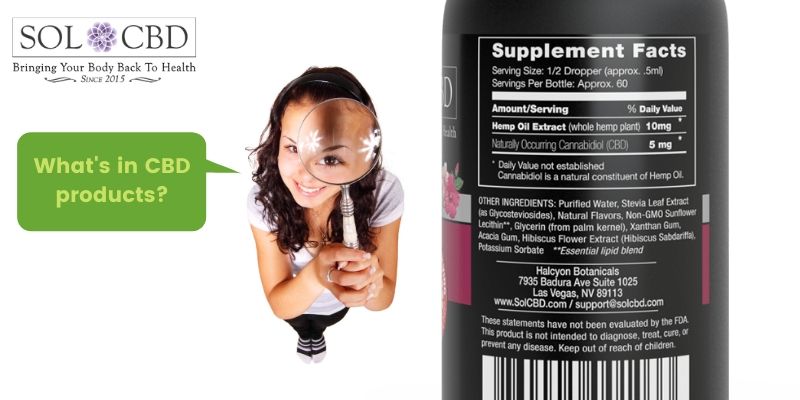Contents
1. Hemp Oil and CBD Oil: What's the Difference?
2. What is Hemp?
2.1 Exploring Industrial Hemp
3. Hemp Seed Oil
3.1 Hemp Oil Has NO CBD
4. Hemp Oil Is Not CBD Oil
4.1 The Extraction Process
5. The History of Hemp and CBD Oil
6. Why Take Hemp Oil?
7. What Is CBD Oil?
8. Why Take CBD?
8.1 The Potential of CBD
9. Is CBD Safe?
10. CBD Product Labels
10.1 The Dangers of Mislabeling CBD Products
11. Our Tinctures
12. Why Do We Use MCT Oil?
12.1 MCT Creamer
13. Our Fastest-Acting Liposomal CBD
14. What's the Bottom Line?
15. Final Thoughts
LISTEN TO THE BLOG POST HERE:
1. Hemp Oil and CBD Oil: What's the Difference?
Ever feel confused when looking at CBD oils and hemp oils?
You may have asked yourself, “What's the difference? And why do the prices vary so much?”

This article will answer all of your questions about CBD and hemp oils. You'll have what you need to make informed purchases online that help you achieve your goals! Find the right product for you based on your needs.
We'll lay it all out for you. You'll learn everything you need to know about hemp oil and CBD oil. You'll be able to impress your friends with how well you understand the differences between these products.
2. What Is Hemp?
While hemp plants have been cultivated by humans for centuries, growing hemp was prohibited during the war on drugs. In fact, the drug-type cannabis plant was the target, but the fiber-producing hemp variety was collateral damage. After nearly a hundred years, we have finally seen progress.

The 2014 Farm Bill allowed industrial hemp to be grown for agricultural purposes. “Industrial hemp” is a legal definition that requires the plant to have a concentration of THC under 0.3%. More progress was made when the 2018 Farm Bill removed hemp from the controlled substances list. [1]
Finally, the door was open.
Industrial hemp became a legal agricultural commodity.
2.1 Exploring Industrial Hemp
Due to the low THC content, any product made from hemp flowers, stalks, stems, or leaves will generally be non-psychoactive and non-impairing. Hemp flowers do contain biologically active cannabinoids. The one we care most about is cannabidiol (CBD).
Hemp is used in making numerous products, such as food, clothing, animal feed, biofuel, biodegradable plastics, paper, paint, and more. One of the most popular products made is hemp oil. We'll now learn about what this is and why it should technically be called “hemp seed oil.” [2]

3. Hemp Seed Oil
“Hemp seed oil” is a better term for products made by extracting the oils from hemp seeds. These products are not made from the drug-type marijuana plant, which has significantly higher levels of THC. The process of growing tall hemp plants and letting them produce seeds is very different from other cannabis-growing practices.
Hemp seeds have a nutty taste to them and are a valuable and nutritious food source. These seeds are packed with essential amino acids, polyunsaturated fatty acids, fiber, minerals, antioxidants, and vitamins. [2]
Being full of these phytonutrients means that hemp seed oil is an excellent choice for your kitchen. It also makes for a tasty salad dressing. (Click here to tweet)

RELATED: Tips for Adding Hemp to Your Food
3.1 Hemp Oil Has NO CBD
What this hemp oil is not filled with is CBD. Although hemp seeds do contain trace amounts of CBD, the presence of CBD in hemp seed oil is likely minimal or even zero. (Click here to tweet)
Hemp oil and CBD oil are completely different for this one reason. The presence of CBD also explains why there is a significant price difference between hemp and CBD oils. [3]

4. Hemp Oil Is Not CBD Oil
Female plants only have so much time and energy. When pollinated by male cannabis plants, they spend much of that time and energy on seeds. If they are not pollinated, they attempt to grow bigger flowers to attract potential pollen.
This results in much higher yields—with more cannabinoids and no seed. When growers want to produce the highest amount of CBD or THC possible, they grow female plants without males. The process of only growing unpollinated females is called sinsemilla.
This method is one of the best ways for growers to maximize plant yield of cannabinoids. [4]

This fact is true for all cannabis plants, but we do not use marijuana plants. In other words, both hemp oil and CBD are made from hemp plants, but their similarity ends there.
4.1 The Extraction Process
We use hemp flowers, stalks, and leaves when we want to extract cannabinoids for use in CBD oil and products. The flowers are covered with trichomes, which produce resin. The resin contains the vast majority of cannabinoids and terpenes.
The plants grown for CBD are hemp strains, not the drug-type marijuana varieties. These are grown to produce the big flowers with lots of CBD. The flowers are put through a CO2 extraction process to create full-spectrum CBD oils.

RELATED: Hemp CBD vs. Marijuana CBD
5. The History of Hemp and CBD Oil
Using hemp seeds and resin for the extraction of oils dates back to 1127 to 1279 CE in China. This hemp oil was likely one of the first CBD oils in human history. [4] (Click here to tweet)

This elixir was used to complete surgical procedures due to its numbing impacts. This anesthetic (pain reducer) was called má yóu (麻油), which meant “hemp oil,” although the modern meaning is “sesame oil.” [4]
According to passages written in 1108 CE, má yóu was said to have a spicy taste. It was used to clear blood, cool body temperatures, relieve fluxes, decrease rheumatism, and eliminate pus. [4]

6. Why Take Hemp Oil?
Hemp oil is a fantastic alternative oil for use at home. As we mentioned, it is filled with lots of nutritious and valuable compounds.
Unfortunately, some consumers buy it for the CBD content, and this is a mistake. If you are looking to ingest CBD safely, what you're looking for is a CBD oil.

7. What Is CBD Oil?
CBD oil is made from hemp plants grown to promote high CBD levels. These hemp varieties have high CBD content, with almost no THC. This contrasts with the drug-type marijuana strains. (Click here to tweet)
As mentioned, these strains must have under 0.3% THC, which is why CBD oil contains so little THC. This is true as long as you are buying real, high-quality CBD oil.
RELATED: The Underlying Difference Between Hemp Oil vs. CBD Oil
8. Why Take CBD?
CBD oil is the product you're looking for when seeking that daily dose of CBD.
Want to know the best part? CBD is also incredibly safe according to research already performed on humans. Beyond being safe, CBD has plenty of potential benefits.

WATCH: What Is Cannabidiol (CBD)?
8.1 The Potential of CBD
Numerous studies indicate the potential benefits of CBD in the following domains:

The therapeutic potential of CBD is not yet fully understood. Early research indicates that CBD has neuroprotective, anti-convulsive, anti-inflammatory, and antitumor actions. [5] (Click here to tweet)
It gets better!
A few preclinical studies have suggested CBD can be helpful with the management of addiction. This includes the management of opioids, cocaine, psychostimulants, cannabis, and tobacco consumption. [6] (Click here to tweet)
Hopefully, more research will help us determine just how helpful CBD can be for reducing problematic substance use. [6]

9. Is CBD Safe?
Yes! CBD is safe—broadly speaking. [7]
CBD has a good safety profile in humans. Potential side effects do include fatigue, appetite changes, and diarrhea. Compared to some of the drugs used to treat similar conditions (like epilepsy), CBD is known to have a milder list of side effects. [7] (Click here to tweet)

That said, we do need more information on how CBD interacts with liver enzymes and other drugs. Always talk to your doctor if you are taking medication and want to start consuming CBD. [7]
10. CBD Product Labels
This is crazy.
Did you know that some of the CBD and hemp products you buy may be completely mislabeled? (Click here to tweet)
Not only are you potentially not getting what you paid for, but you may also experience impacts you didn't expect.
A critical factor in ensuring consumer safety is accurate labeling.

10.1 The Dangers of Mislabeling CBD Products
When labels ignore potential THC content, consumers may experience unwanted impairment. Products must be made safely to ensure that no contaminants are present. The impacts of undesirable compounds in CBD products can range from mild to rather dangerous. [8]
You might be wondering:
What about the CBD products we make here at SOL CBD?
We use hemp organically grown in Colorado. We use CO2 extraction to create our cold-processed oils. There are no solvents or harmful chemicals inside our products. They are legal in all U.S. States. (Click here to tweet)

RELATED: What Percentage of CBD Is in SOL CBD?
11. Our Tinctures
CBD Tinctures fall under the category that is CBD oils. We don't use hemp seeds. We extract CBD from the leaves, stalks, and buds of organic hemp plants.
This is how we extract high-quality CBD oils to create products perfect for you! Our tinctures are highly concentrated to give you that potent dose you need!
WATCH: SOL*CBD 3600mg High CBD Tincture
Tinctures are an effective and straightforward way of getting your daily full-spectrum dose. With our tinctures, you'll get all the phytonutrients, enzymes, and vitamins you need. Using hemp-derived CBD, we use CO2 extraction to pull out the valuable compounds safely. (Click here to tweet)
It gets even better, as we then combine this pure extract with high-concentrate MCT oil.
RELATED: CBD & Coconut Oil: Uses and Benefits That Will Surprise You
12. Why Do We Use MCT Oil?

Medium Chain Triglycerides (MCT) are the fats naturally found in coconut oil. Human bodies easily break down and make use of the healthy fats found in MCT oil. The combination of MCT and CBD oils helps improve the bioavailability of CBD. The mixture allows you to get the potential health benefits of both at the same time. (Click here to tweet)
12.1 MCT Creamer
Our sister company, Halcyon Botanicals, produces an MCT creamer. This creamer is great if you're looking to boost your energy levels and support your pursuit of a healthy lifestyle. MCT oil can help promote feeling full and reducing appetite through the release of peptide YY and leptin. This can help you prevent obesity and even lower your body weight and waist circumference.
RELATED: CBD Oil Could Help Support Your Weight Loss
Here's the real kicker:
Not only do we use great starting plant material, but we also use a process that stands out in the pack.
WATCH: SOL CBD Whole Body Activation Tinctures
13. Our Fastest-Acting Liposomal CBD
Using our NEW patent-pending process, we create highly effective hemp products. These products outperform knockoffs as well as other delivery methods for CBD. Others may say they use nanotechnology, but none compare to our unique and incredible process. (Click here to tweet)
RELATED: Our New Advanced Liposomal Formula—What You Need to Know
14. What's the Bottom Line?
Next time you're shopping online for a CBD oil, do not get distracted by hemp oil! Hemp oil is a nutritious food source that goes great on salads. It does NOT contain any CBD!
If you're hoping to gain CBD's potential benefits, look to CBD oils instead. Now that you understand these differences well, you'll grasp the reason there is such a difference in price between these two products.
To ensure that you're getting what you pay for, look to a reputable producer of CBD oil. The products we create at SOL CBD are organic, packed with CBD, and labeled accurately. Our line of products can help you get your daily dose of CBD in a way that works for you! (Click here to tweet)
RELATED: CBD Oil vs. CBD Capsules—Which One Has the Most Health Benefits?
Consult your medical professional before looking to make any major lifestyle changes. And next time you make a salad, select hemp oil for the phytonutrients.
15. Final Thoughts
If you're looking for CBD, stick with high-quality CBD oils. For extra convenience, you can even get your CBD in capsule form. You can also get your CBD dose with our CBD-Infused Balm.
WATCH: SOL CBD Cannabidiol Infused Balm
In conclusion, armed with your new knowledge of hemp oil vs. CBD oil, you will now know how to buy the right product for you. Finally, you can also impress friends with your thorough understanding of CBD oils.
Sources:
- https://lib.dr.iastate.edu/cropnews/2613/
- https://www.liebertpub.com/doi/10.1089/can.2020.0001
- https://www.tandfonline.com/doi/abs/10.1300/J133v02n04_04
- https://www.jstor.org/stable/10.1525/j.ctt3fh2f8
- https://www.sciencedirect.com/science/article/abs/pii/S1043661820311300
- https://www.ncbi.nlm.nih.gov/pmc/articles/PMC4444130/pdf/sart-9-2015-033.pdf
- https://www.ncbi.nlm.nih.gov/pmc/articles/PMC5569602/
- https://www.liebertpub.com/doi/10.1089/can.2019.0101


































